Grand Canyon National Park

Don’t let your day at the Grand Canyon be summed up by “wow, what a hole in the ground!” With this expert-led private tour, you’ll get to tag along with a Master Naturalist as you explore one of the wonders of the world. Just your group, you’ll get to customize the full-day adventure to your liking, choosing between back country hikes, scenic viewpoints, flora-filled excursions, and more. To visit the Grand Canyon, click here.
Dogwood Canyon
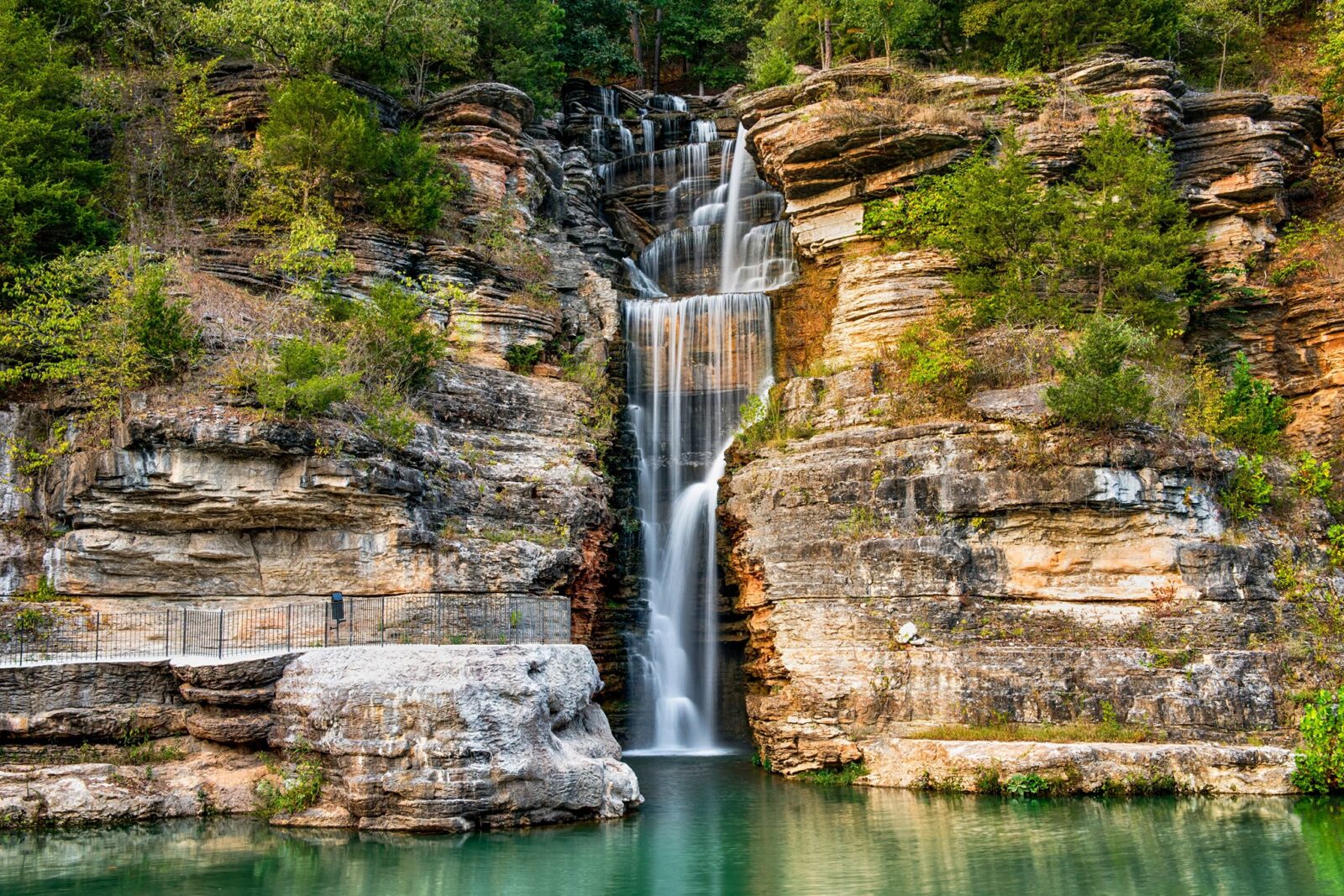
Dogwood Canyon has been described as an outdoor wonderland just waiting to be explored. This Midwestern paradise is spread out on more then 10,000 acres of ruggedly beautiful terrain. The park has 30 different waterfalls, 2 lakes, and a beautiful meandering stream, that winds its way through the canyon. Dogwood Canyon is located at 2038 West State Hwy 86 Lampe, Missouri. For more information, click here.
Bryce Canyon

Bryce Canyon National Park showcases the red rock canyons and rugged horizon-stretching vistas that make Utah famous. With a variety of otherworldly geological formations, Bryce Canyon is an active traveler’s playground, crammed full of pinnacles, steeples, spires, and hoodoos, which are thin eroded rock formations that reveal sedimentary layers of red, orange, and white. For more information or to book your trip, click here.
Niagara Falls
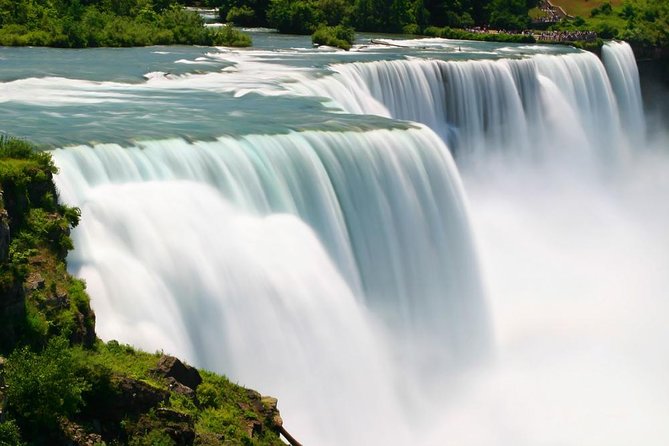
One of North America’s most majestic natural wonders, Niagara Falls is made up of three waterfalls—American Falls, Bridal Veil Falls, and Horseshoe Falls—which plunge dramatically over the Niagara River. The falls straddle the border between Canada and the US with viewpoints and falls-themed attractions on both sides. For more information or to book your trip, click here.
Havasu Falls
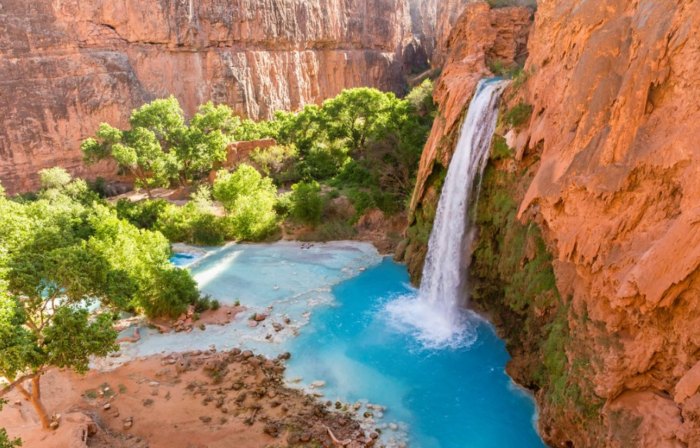
Havasu Falls in Arizona, is one of the most beautiful destinations on Earth, however very few will ever see it. Of all of America’s waterfalls, Havasu Falls is one of the most difficult to reach. Aside from the challenging hike, the popular waterfall is located on Havasupai tribal lands, and is one of the most admired waterfalls in the country! A permit is required and must be obtained for visiting the Havasupai Reservation. Then it’s an eight mile hike from the hiker’s parking lot to Havasupai Village; and another two miles from the village to Havasu Falls. For a fee, you can bypass the hike and jump aboard a helicopter that ferries hikers in and out of the canyon. For more information, click here.
Glacier National Park
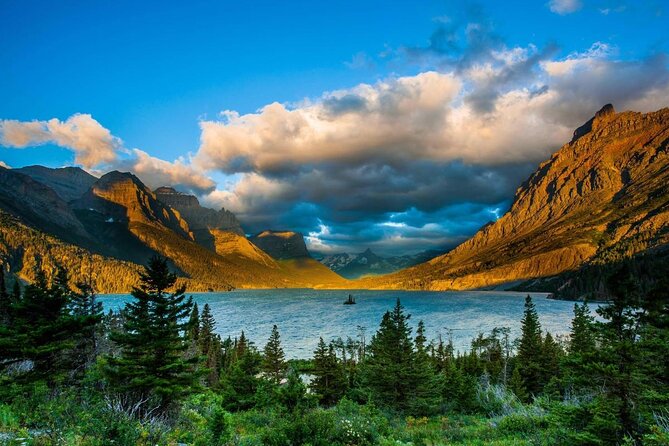
One of the nation’s most pristine and magnificent natural wonders, Glacier National Park–the Crown of the Continent–encompasses a vast landscape of snow capped mountains and turquoise glacial lakes along the Continental Divide. One of the top reasons folks often visit Glacier National Park is to travel along the Going-to-the-Sun Road, For more information or to book your trip, click here.
Watkins Glen State Park
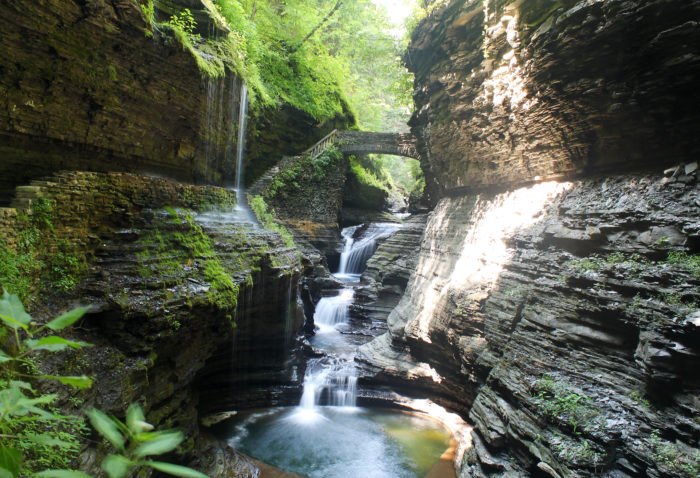
When it comes to beautiful scenery, very few places can compare to Watkins Glen State Park. Whether you enjoy hiking along the nature trails or taking in the incredible views, recreational opportunities abound. Watkins Glen is the most famous of the Finger Lakes State Parks, with a reputation for leaving visitors spellbound. Watkins Glen State Park is located at 1009 North Franklin Street Watkins Glen, New York. For more information, click here.
Letchworth State Park
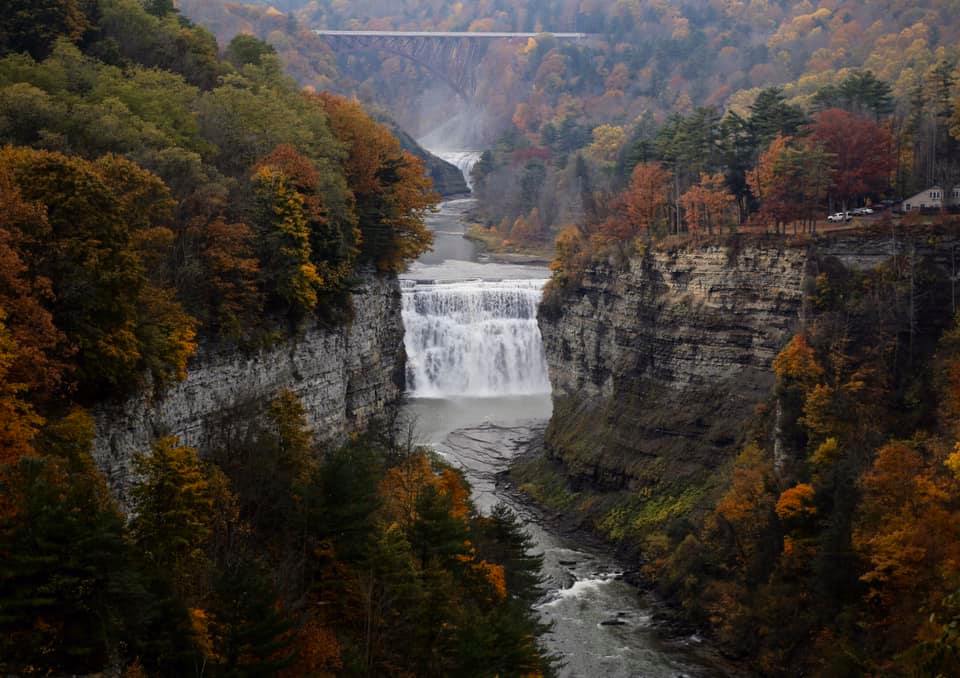
The United States is home to over 10,000 state parks, scattered all across the country, picking one as the absolute best seems to be an impossible task. However there is one park that constantly comes up in the conversation: Letchworth State Park. This incredible park is often referred to as the Grand Canyon of the East! Weather you agree with this assessment or not, you will surly agree that its one of the most scenically magnificent parks in the eastern U.S. The Genesee River roars through the gorge over three major waterfalls between cliffs reaching as high as 600 feet in some places! While the gorge is stunning in its own right, its only a small portion of everything the park has to offer. The park encompasses more than 14,000 acres and is roughly 17 miles long, with 3 incredible waterfalls, and several smaller falls scattered throughout! Letchworth State Park is located at 1 Letchworth State Park, Castile, NY 14427, and opens daily at 6AM! For more information, click here.
Blanchard Springs Caverns
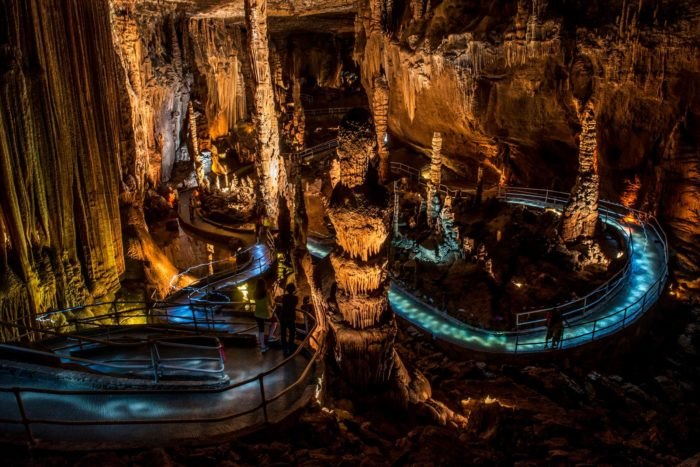
Blanchard Springs Caverns is one of the most spectacular and carefully developed caves found anywhere in the world. It is located in the Ozark National Forest and is believed to have been formed, and continually changed, by an ongoing mountain spring that pours into a glassy-surfaced trout pond below the cave, called Mirror Lake. The cave is located at 704 Blanchard Springs Road, in Fifty-Six, Arkansas. For more information, click here.
Coral Reef State Park
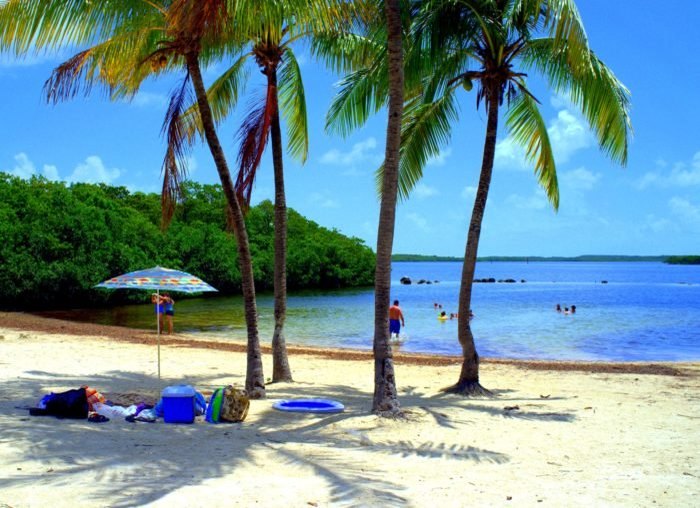
John Pennekamp Coral Reef State Park Concession Stand
Key Largo’s John Pennekamp Coral Reef State Park is one of a kind, offering an amazing glimpse into the underwater world. Renowned for being the country’s first undersea park, John Pennekamp Coral Reef State Park encompasses an impressive 70 nautical square miles. While many visitors view the park’s colorful coral reefs and teeming marine life on a glass-bottom boat tour, one can get an even closer look by scuba diving or snorkeling. For more information, click here.
Gilchrist Blue Springs State Park-Florida
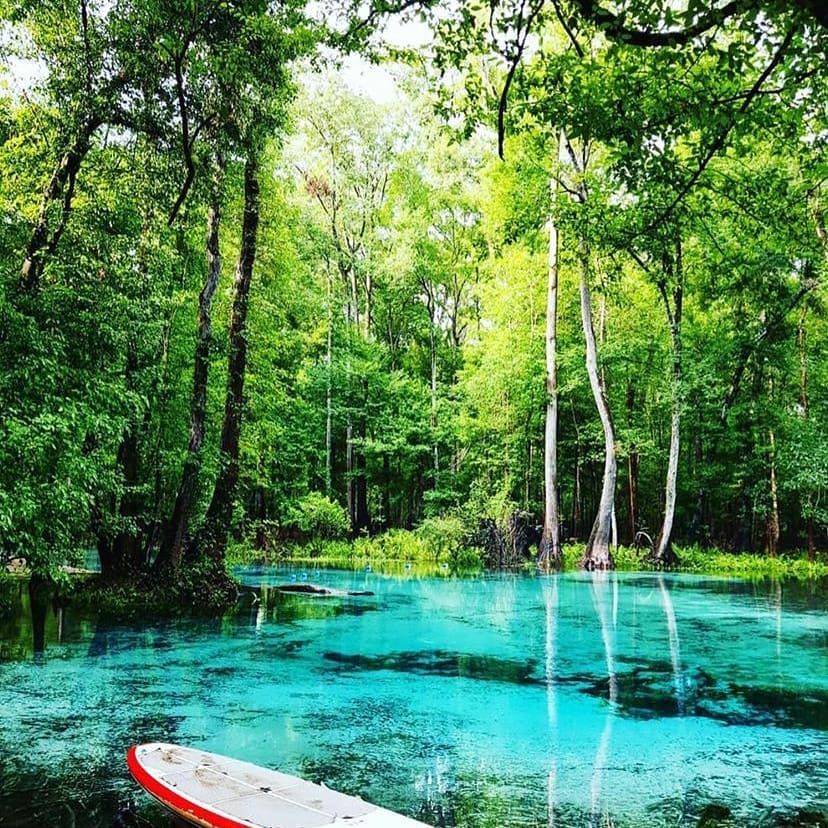
Gilchrist Blue Springs State Park is one of the many natural spring parks within the state. The park contains a collection of natural springs, including a large second-magnitude spring that produces an average of 44 million gallons of water per day. The other named springs on-site are Little Blue Spring, Naked Spring, Kiefer Spring and Johnson Spring, which provide scenic vistas and photographic opportunities. Paddling, snorkeling and swimming are all popular at the park. Pavilions are available, and a concession stand provides food and beverage service plus paddling equipment rentals. Other popular activities include camping, hiking, nature study and picnicking. For more information on this park, click here.
Hamilton Pool Preserve-Texas

Hamilton Pool Preserve was designated a nature preserve by the Travis County Commissioner’s Court in 1990. Located 3/4 mile upstream from its confluence with the Pedernales River, Hamilton Creek spills out over limestone outcroppings to create a 50-foot waterfall as it plunges into the head of a steep box canyon. The waterfall never completely dries up, but in dry times it does slow to a trickle. However, the pool’s water level stays pretty constant, even during periods of drought. A unique natural area surrounds this pool, collapsed grotto and canyon, formed by thousands of years of water erosion. Lush plant communities, a variety of wildlife species and natural shelter attracted the area’s first inhabitants. Cultural remains date back over 8,000 years. The area is incredibly gorgeous and is one of the most photographed locations in Texas. Due to the popularity reservations are required. For more information, click here.
The Witches Gultch-Wisconsin

Witches Gulch is a spectacular and spooky walk through a narrow canyon carved by wind and water and filled with fern glens, shadowy passages and hidden whirlpool chambers. At Stand Rock, you’ll walk to the base of this imposing pillar of sandstone, then watch as high above you, a trained dog makes the famous leap from cliff face to Stand Rock and back again. For more information, click here.
Mount Rushmore

The stony faces of presidents George Washington, Thomas Jefferson, Abraham Lincoln, and Theodore Roosevelt peer out from the iconic granite outcrop known as Mount Rushmore National Memorial. The monument in the Black Hills of South Dakota is an American symbol, and with some 3 million visitors each year, it’s the state’s most popular attraction. For more information or to book your trip, click here.
Mammoth Cave National Park-Kentucky
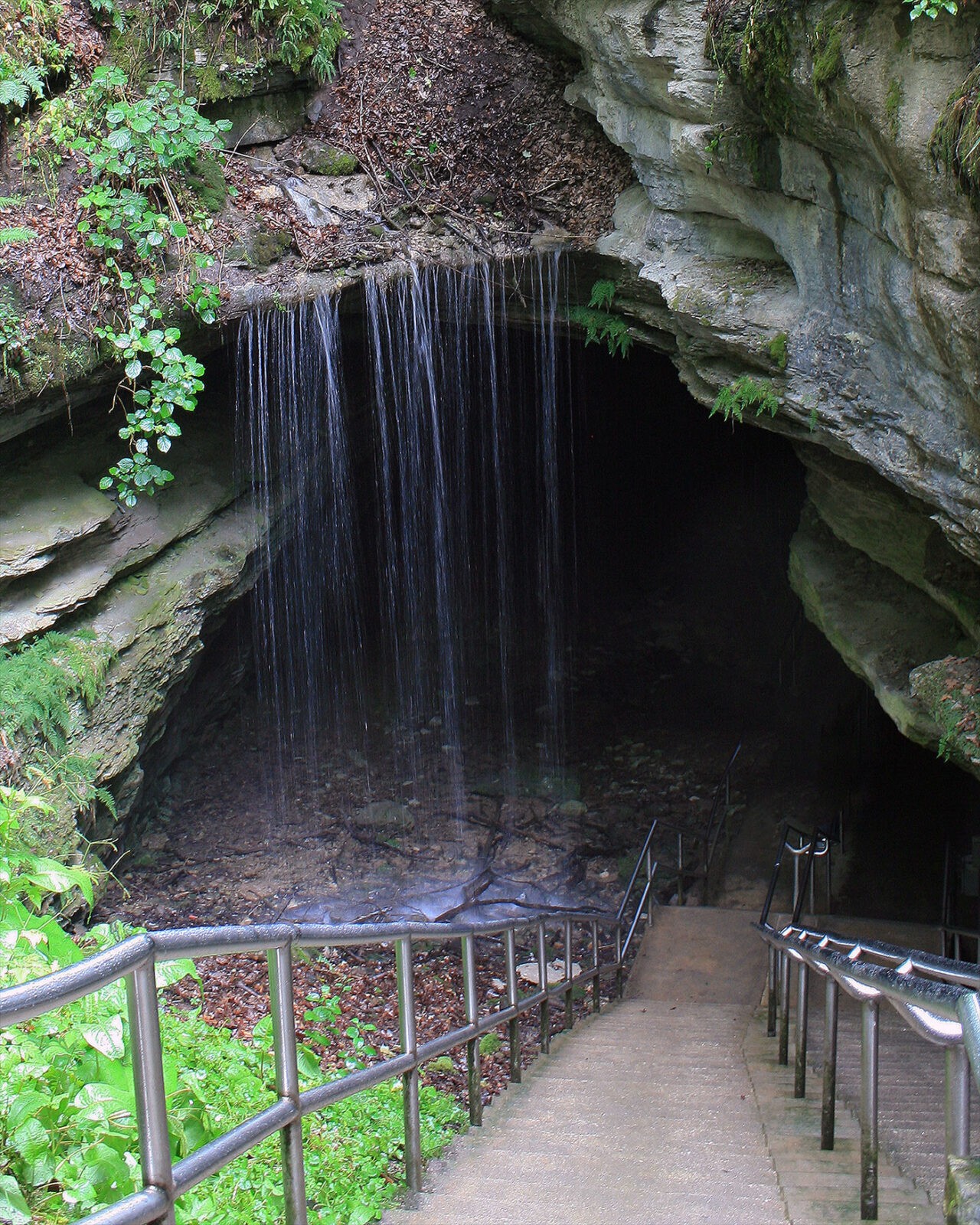
Mammoth Caves is the states only national park and is considered the worlds longest cave system. Mammoth Cave in Kentucky is the world’s longest known cave system, with more than 400 miles explored, and one of the oldest tour attractions in North America. Rolling hills, deep river valleys, and the worlds longest known cave system. A journey into Mammoth Cave on a guided cave tour is an essential part of a visit to the park. For more information, click here.
Mesa Verde National Park
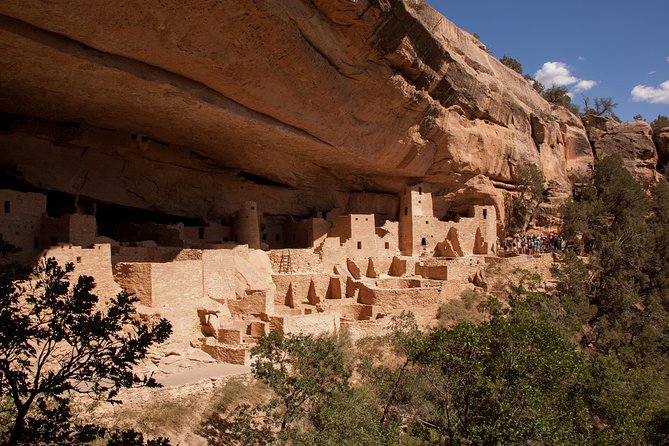
The first national park to “preserve the works of man,” Mesa Verde stands alone as a national park, archaeological site, and UNESCO World Heritage Site. On this half-day tour, you’ll skip the search for parking and go straight to exploring the ancient cliff dwellings with a guide, learning about the park’s flora and fauna, geology, and human mystery—these ruins were abandoned around the year 1300. For more information or to book your trip, click here.
Horseshoe Bend
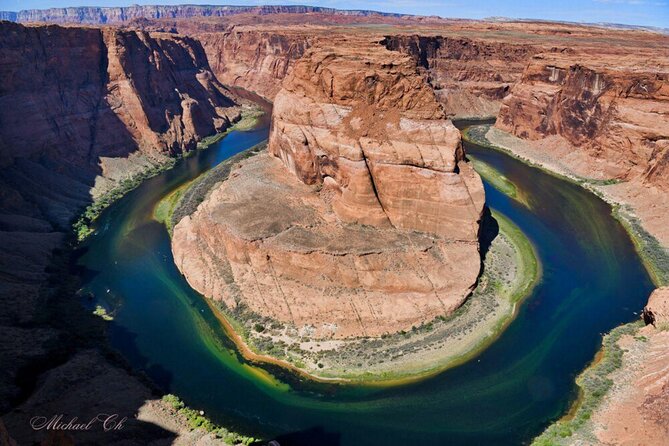
Find some of the most inspiring scenic views in the American Southwest at Horseshoe Bend. The site’s scenic overlook sits on a clifftop 1,000 feet (300 meters) above the Colorado River, offering a bird’s-eye vista of the horseshoe-shaped curve in the sandstone canyon below created by the rushing river over five million years. For more information or to book your trip, click here.
Antelope Canyon
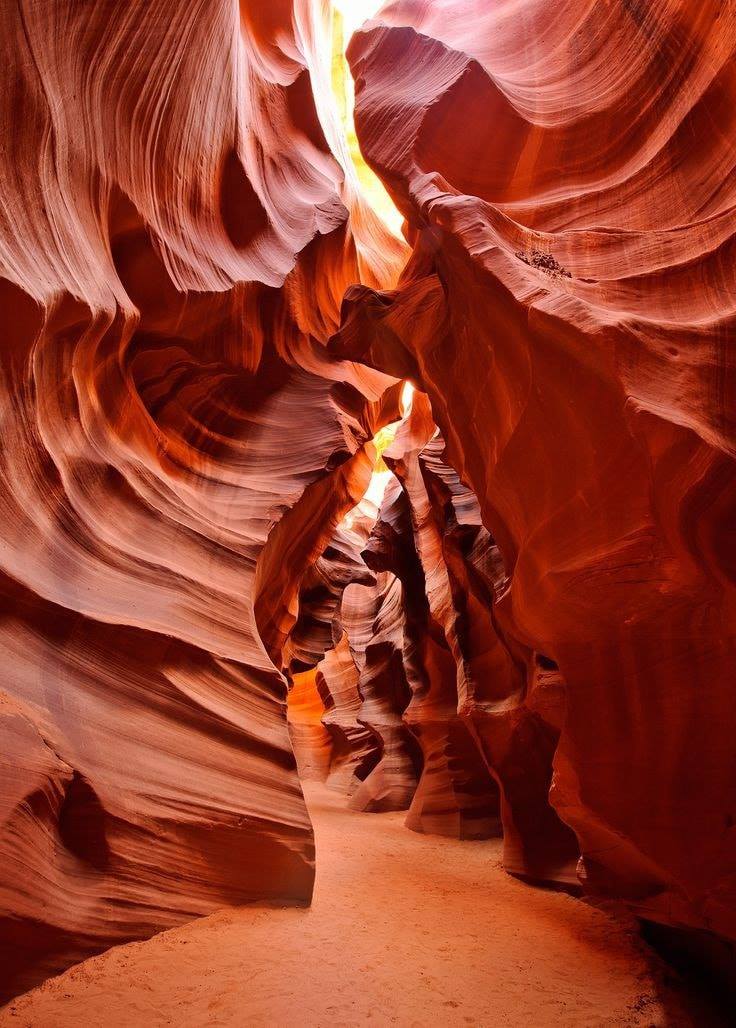
Situated on Navajo land in the Lake Powell Navajo Tribal Park, Arizona, Antelope Canyon is one of the most-photographed slot canyons in the United States. Formed by water rushing through the rock over the course of millions of years, this natural wonder has two separate sections—the deep-but-narrow Upper Antelope Canyon (also known as Spiral Rock Arches) and the Lower Antelope Canyon. For more information or to book your trip, click here.
Arches National Park

The eroded red rock wonderland of Arches National Park houses more than 2,000 natural stone arches, the densest concentration in the world. Geological marvels abound—here you’ll find hundreds of soaring pinnacles, the iconic Delicate Arch, and Landscape Arch, the largest natural arch in the world at 290 feet across. For more information or to book your trip, click here.
Canyonlands National Park
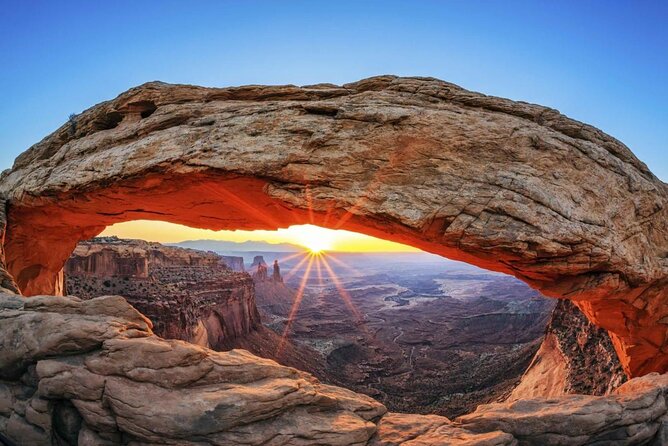
Set in the high desert of the American Southwest, Canyonlands National Park comprises 337,598 acres of rugged landscape divided into four distinct districts by the Green and Colorado rivers. Deep craters, towering rock spires, white cliffs, and majestic buttes dominate the landscape of Utah’s largest national park. For more information or to book your trip, click here.
Zion National Park

Carved over time by the Virgin River, Zion National Park is a remarkable 148,000-acre (59,893-hectare) stretch of white, pink, and red rock formations in southern Utah’s canyon country. The state’s first national park draws hikers, birders, and nature lovers with its cliffs and mesas, waterfalls and wildflowers, and varied wildlife from jackrabbits to condors. For more information or to book your trip, click here.
Garden Of The Gods-Colorado

An urban park and designated national landmark in Colorado Springs, the Garden of the Gods encompasses 1,367 acres (553 hectares) of unique wilderness, Great Plains grassland, and juniper woodlands. Highlights include the red rock formations Balanced Rock, Gateway Rock, and the Three Graces, as well as petroglyphs from the original Native American occupants of the area, the Ute people. For more information or to book your trip, click here.
Ecola State Park
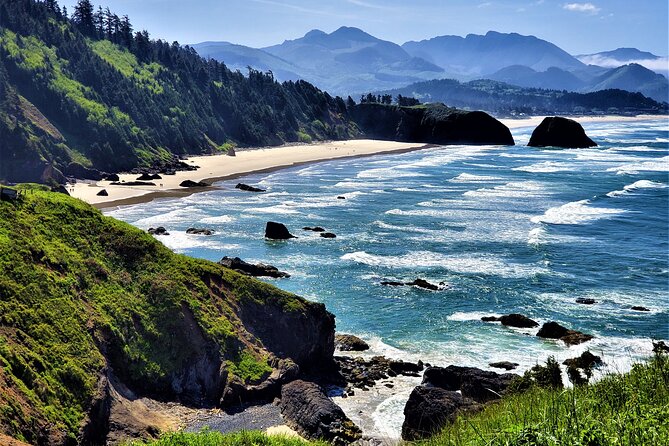
Less than a 2-hour drive from Portland, the Oregon Coast is celebrated for its natural beauty. This tour gives you the chance to experience some of the best of what the coast has to offer, without having to do any driving. You’ll visit the coastal town of Cannon Beach, spend time among the trees of Ecola State Park, and learn about local wildlife from your naturalist guide. For more information or to book your trip, click here.
Pictured Rocks National Lakeshore
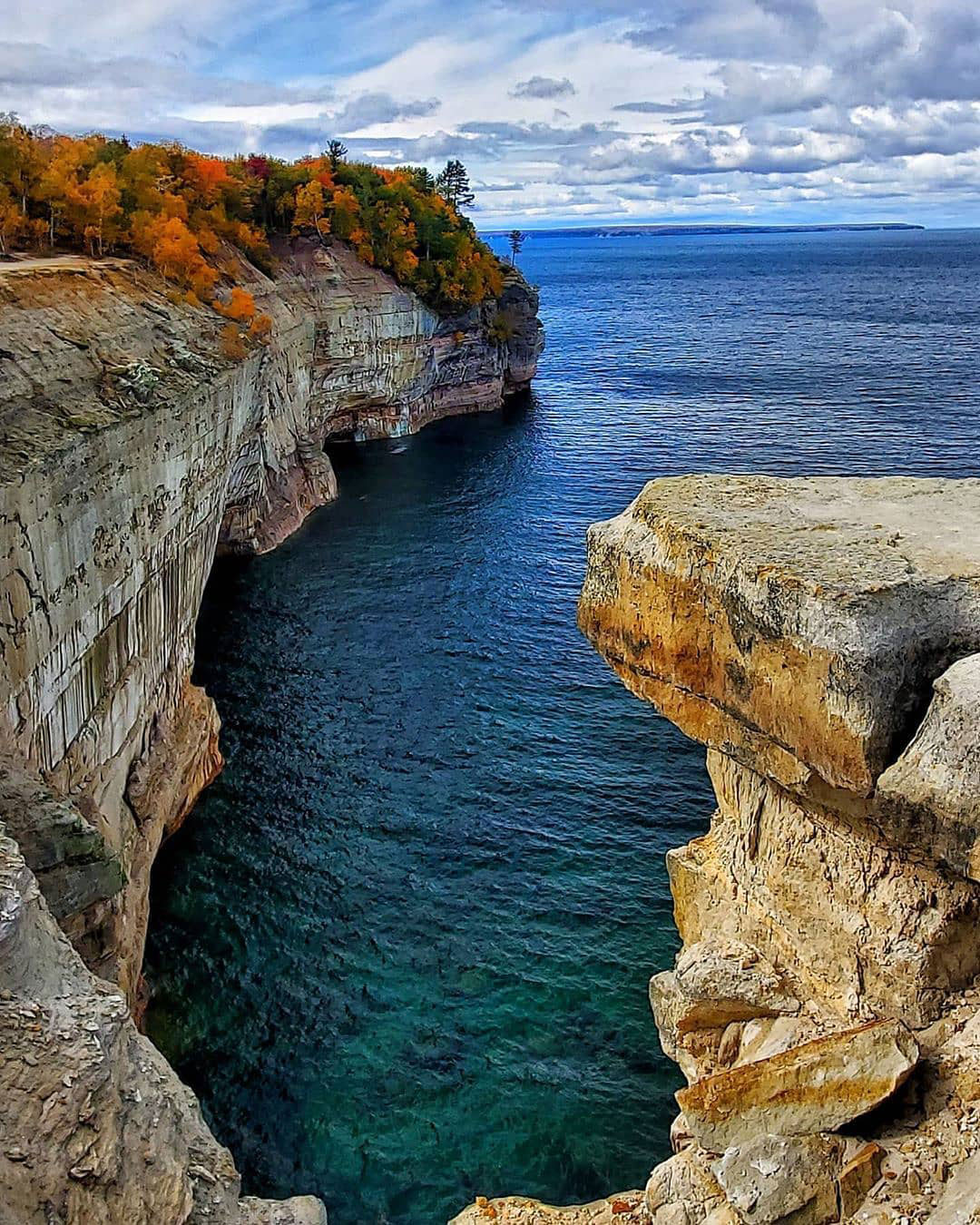
Unlike any other place on Lake Superior, Pictured Rocks offers the opportunity to explore miles of pristine beaches, hike nearly 100 miles of trails, view towering sandstone cliffs, and experience the serenity of northern woodlands. Sandstone cliffs, beaches, sand dunes, waterfalls, inland lakes, deep forest, and wild shoreline beckon you to visit Pictured Rocks National Lakeshore. The power of Lake Superior shapes the park’s coastal features and affects every ecosystem, creating a unique landscape to explore. Hiking, camping, sightseeing, and four-season outdoor opportunities abound. For more information, click here.
Yosemite National Park
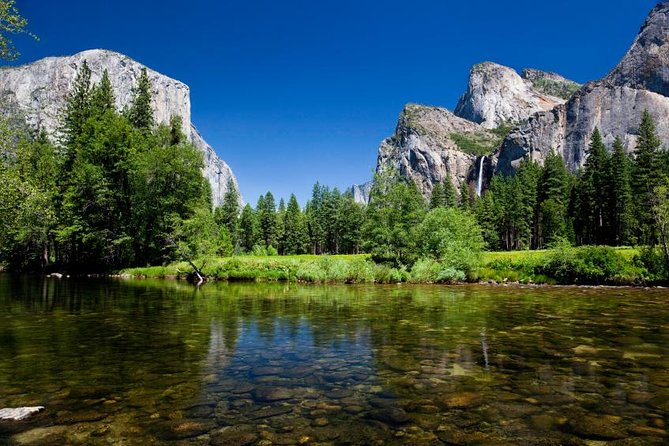
One of the United States’ most popular national parks, Yosemite National Park is packed with natural beauty and views that never cease to amaze. From the majestic mountain peaks to the green meadows on the valley floor (plus all the waterfalls and groves of tall Sequoia trees in between), there’s no shortage of outdoor and leisure activities set against the park’s epic views. And whether you spend a single day or stay for a multi-day camping trip, you’ll feel a deeper appreciation for the nature at this national treasure. For more information or to book your trip, click here.
Sinkyone WIlderness State Park-Califorina

Sinkyone Wilderness State Park lies on the southern portion of the Lost Coast, a 60-mile stretch of wilderness comprising the park and the King Range National Conservation Area. Today, the Lost Coast Trail follows the whole length of the rugged Sinkyone coastline. Gray whales pass by during the winter and early spring. It’s an arresting landscape, with canyons, arches, tide pools, sea stacks, seasonal wildflowers, waterfalls, and dark sand beaches. On a sunny day, the sea looks turquoise, giving the park tropical feeling. For more information, click here.
Carlsbad Caverns National Park-New Mexico
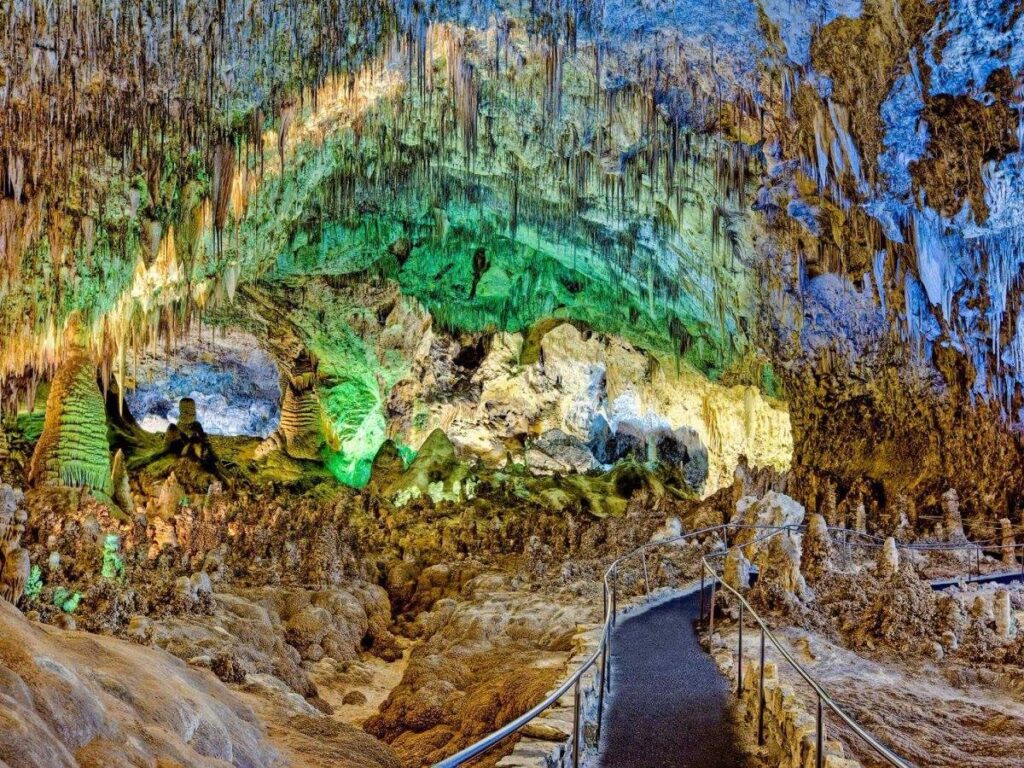
Carlsbad Caverns National Park features more than 119 different caves, spread out over more than 73 miles of the Chihuahuan Desert. This National Park is known for its beauty, both above and below ground. Above ground you can find high ancient sea ledges, deep rocky canyons, flowering cactus, and desert wildlife! Below ground lies some of the most beautiful caves on Earth. For more information, click here.
Kasha-Katuwe Tent Rocks National Monument
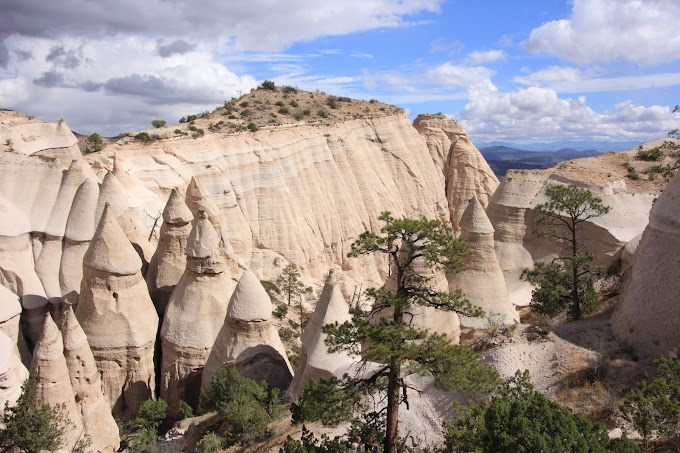
The Kasha-Katuwe Tent Rocks National Monument is a remarkable outdoor laboratory, offering an opportunity to observe, study, and experience the geologic processes that shape natural landscapes. The National Monument, on the Pajarito Plateau in north-central New Mexico, includes a national recreation trail and ranges from 5,570 feet to 6,760 feet above sea level. It is for foot travel only, and contains two segments that provide opportunities for hiking, bird-watching, geologic observation, and plant identification. The cone-shaped tent rock formations are the products of volcanic eruptions that occurred 6 to 7 million years ago and left pumice, ash, and tuff deposits over 1,000 feet thick. Tremendous explosions from the Jemez volcanic field spewed pyroclasts (rock fragments), while searing hot gases blasted down slopes in an incandescent avalanche called a pyroclastic flow. For more information, click here.
Everglades National Park-Florida
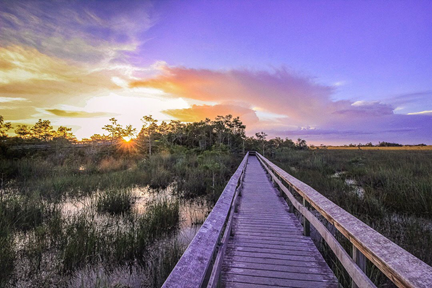
Sandwiched between the sizzling beaches of Miami and the white sands of Key West, the 1.5 million-acre Everglades National Park stands in stark contrast to its seductive neighbors—but don’t make the mistake of passing it by. Visit the park and discover for yourself the spectacular swampy weirdness that draws over one million visitors every year and constitutes a one-of-a-kind destination for nature lovers. For more information or to book your trip, click here.
Chimney Rock State Park-North Carolina
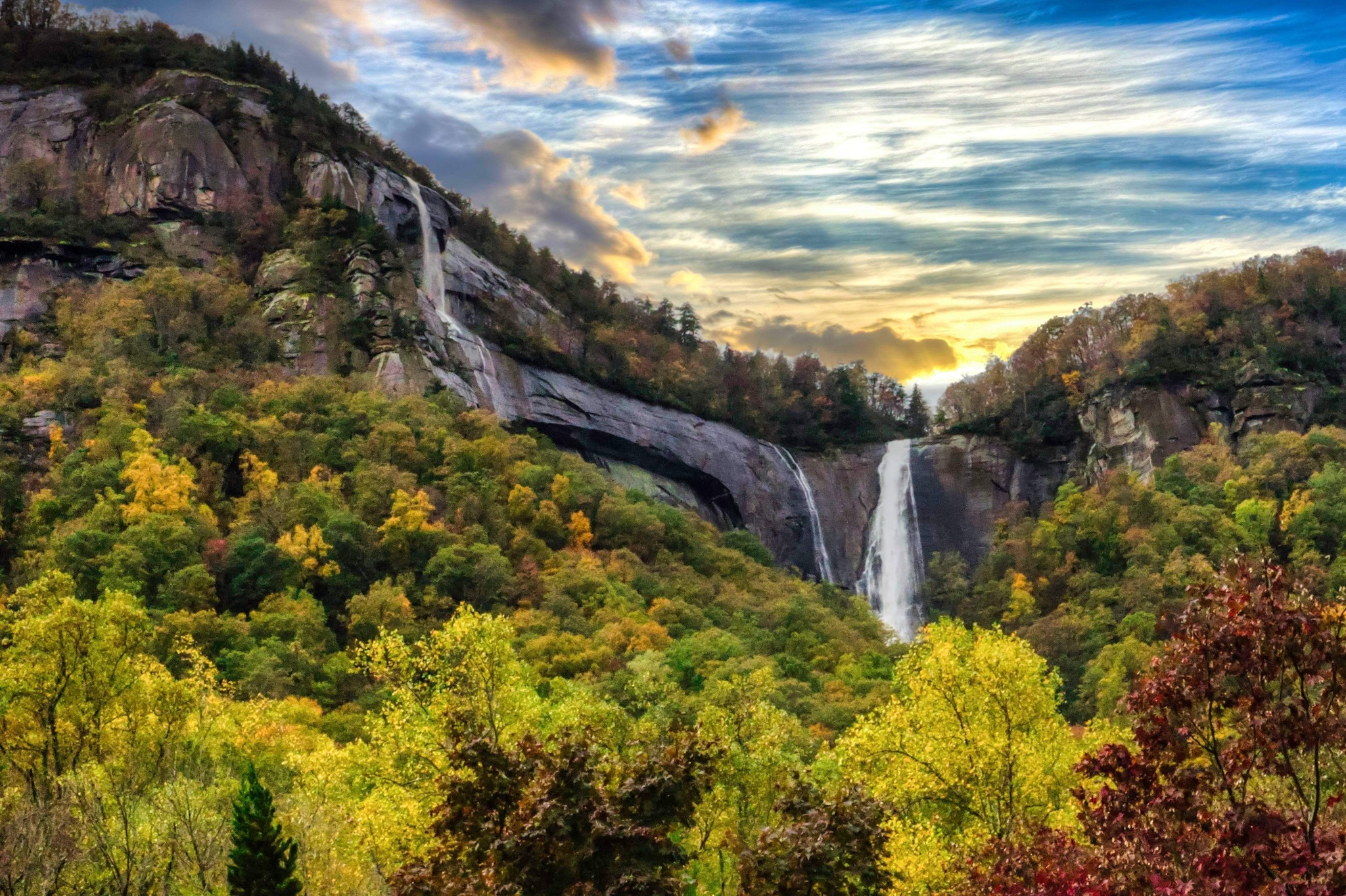
Chimney Rock at Chimney Rock State Park is a nature lover’s paradise with a collaboration of spectacular views and incredible hiking trails. They combine to create a mountain adventure experience that is postcard perfect. With ample opportunities to learn and explore, along with hiking trails, climbing opportunities, and exciting ways to break a sweat and stay fit, you’re in for a bit of learning, and a bit of fitness. For more information, click here.
Smokey Mountains National Park

Ridge upon ridge of forest straddles the border between North Carolina and Tennessee in Great Smoky Mountains National Park. World renowned for its diversity of plant and animal life, the beauty of its ancient mountains, and the quality of its remnants of Southern Appalachian mountain culture, this is America’s most visited national park. Plan your visit today! Feel the cool spray of a waterfall. Camp under the stars. Explore a historic mill. There’s plenty to see and do in the park! For more information, click here.
New River Gorge National Park-West Virginia
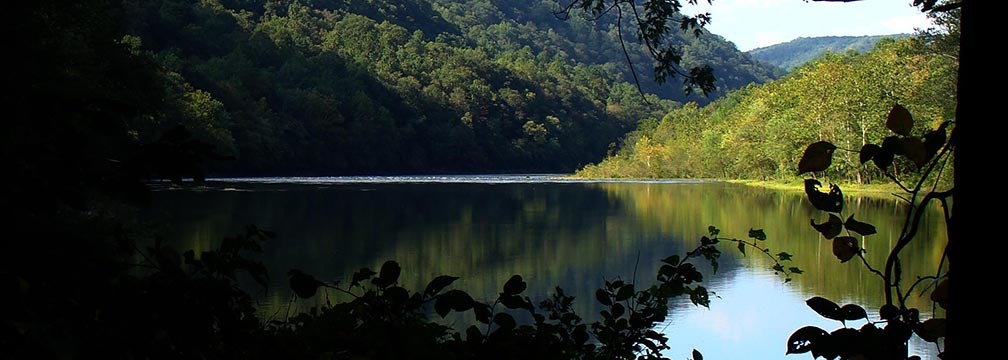
Established in 1978, New River Gorge National River was redesignated as New River Gorge National Park and Preserve in 2021. The park encompasses over 70,000 acres of land along 53 miles of the New River from Bluestone Dam to Hawk’s Nest Lake. A rugged, whitewater river flowing northward through deep and spectacular canyons, the New River is actually among the oldest rivers on Earth. Here in southern West Virginia, the New River has carved and continues to carve the deepest and longest river gorge in the Appalachian Mountains. Hiking along the many park trails, rafting the river, or biking along an old railroad grade, the visitor will be confronted with spectacular scenery that certainly makes this place worthy of being included in our national park system. For more information, click here.
Lake Tahoe-California & Nevada

There are so many reasons to visit Lake Tahoe. Many come to partake in the world class fishing, others for the breathtaking scenery. Whatever your reason may be, Lake Tahoe is an excellent vacation destination! This incredible natural attraction combines, beautiful blue water with stunning mountain scenery. For more information, or to begin planning your trip click here.
Shoshone Falls Park-Idaho
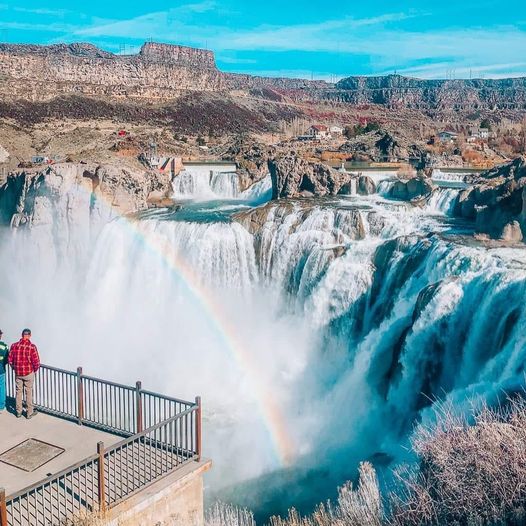
Often referred to as the Niagara of the West, Shoshone Falls is a must-see attraction in Twin Falls, Idaho. At 212 feet tall and 900 foot wide, Shoshone Falls is one of the largest natural waterfalls in the United States surpassing the height of the famous Niagara Falls. Shoshone Falls is located on the Snake River as it carves its way through a deep basalt Canyon on its way to the Columbia River. For more information, click here.
Red Rock Canyon National Conservation Area-Nevada
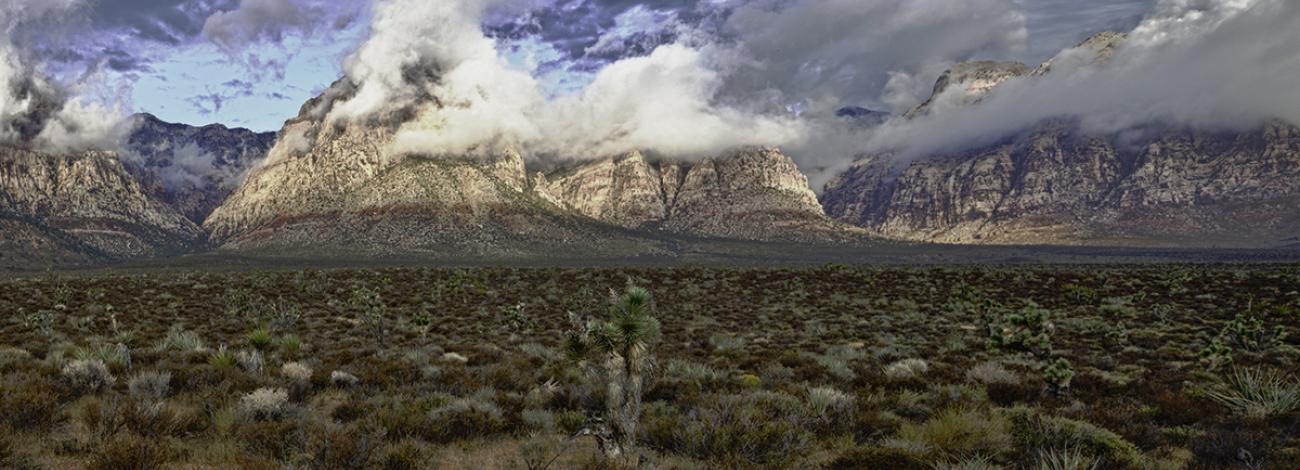
The 195,819-acre Red Rock Canyon National Conservation Area in Nevada comprises a network of narrow canyons, seasonal waterfalls, rock art sites, and surreal rock formations with ample opportunity for hiking, biking, rock climbing, and desert wildlife watching, all a short drive from Las Vegas. For more information or to book your trip, click here.